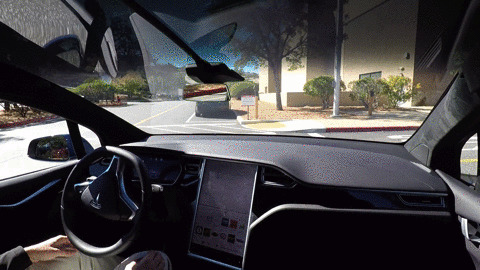Tesla Slams Brakes On Autonomous Ride-Sharing
Bad news if you were hoping to dispatch your autonomous Tesla to pick up a few Uber or Lyft passengers and contribute to its own monthly lease payment. While the electric car company may be gung-ho about its self-driving technology, the hardware for which will be preinstalled on every car produced from now on, it's not so happy with it being used for ride-sharing schemes. That is, not unless it's Tesla's own.
For Tesla, it's no small commitment. All new Model S and Model X vehicles currently in manufacturing will get the updated suite of sensors the autonomous driving system requires. Meanwhile, the Model 3 – the first deliveries of which are expected toward the end of 2017 – will also be equipped with those sensors.
Though the hardware will be included in the sticker price, consisting of eight cameras giving 360-degree vision around the vehicle, along with radar and ultrasonics, the software will be a paid upgrade. That'll be $8,000, Tesla's Elon Musk confirmed last night. In contrast, the current Autopilot functionality is priced at $3,000.

It wasn't long before some Tesla fans were voicing their eagerness to offset that fee with the ability to send out their self-driving car to make some money on the side. A vehicle that can drive itself, of course, makes for a promising autonomous taxi. Indeed, it's something both Uber and Lyft are working on themselves.
There's no sign of vehicles by either company making it to public roads before Tesla's new cars do, though. Meanwhile, Tesla has pre-empted such owner ambitions, and has cut them off before they can get started. In a note on the updated Autopilot product page, the automaker makes very clear that its self-driving system won't work if used with third-party ride-sharing services.
"Please note also that using a self-driving Tesla for car sharing and ride hailing for friends and family is fine, but doing so for revenue purposes will only be permissible on the Tesla Network, details of which will be released next year" Tesla
It's unclear how, exactly, Tesla intends to police this. Although less commonly associated with cars than, say, phones or consoles, end-user licensing agreements (EULA) generally have some combination of clauses which, simply by using the products, are considered agreed to on the part of the owner. In short, even though you may have bought the car from Tesla, it might well still have the legal power to limit how you use your vehicle.
The automaker could react punitively, ending future software updates like those Musk promised would gradually deliver autonomous features to its cars. It might opt to disable self-driving abilities altogether for those who flout the ban, or remove Supercharger access. The car's integrated cellular connectivity is a double-edged sword, and just as owners have previously complained at Autopilot being tweaked over time through OTA updates after a small percentage of owners used it dangerously, Tesla could also rely on it to track and punish those operating outside of the EULA's terms.
Meanwhile, it's also a new tidbit about Tesla's own ride-sharing intentions. Presumably now known as the "Tesla Network", the idea was raised in Musk's "Master Plan Part 2" earlier this year, with owners invited to make their car available for others to use in periods of downtime. Then, of course, it was presumed that those renting the cars would be driving them themselves.
With the updated Autopilot, though, participating cars could drive from where their owners have left them, locate a renter, transport them to their destination, and then be back for when the owner requires them again. Tesla has already said that the system will be able to monitor calendars to figure out when they're needed and when they'll be idle. Meanwhile, the "robot-snake" charger would be able to plug the car in and keep the batteries topped up without human involvement.
Still, even if Tesla does offer owners a way to make a little cash on the side in such a manner, the limits on them participating in third-party services are unlikely to go down well. We've contacted Tesla for a comment on the limitation, and will update if we hear back from the company.
VIA Ars Technica
SOURCE Tesla
